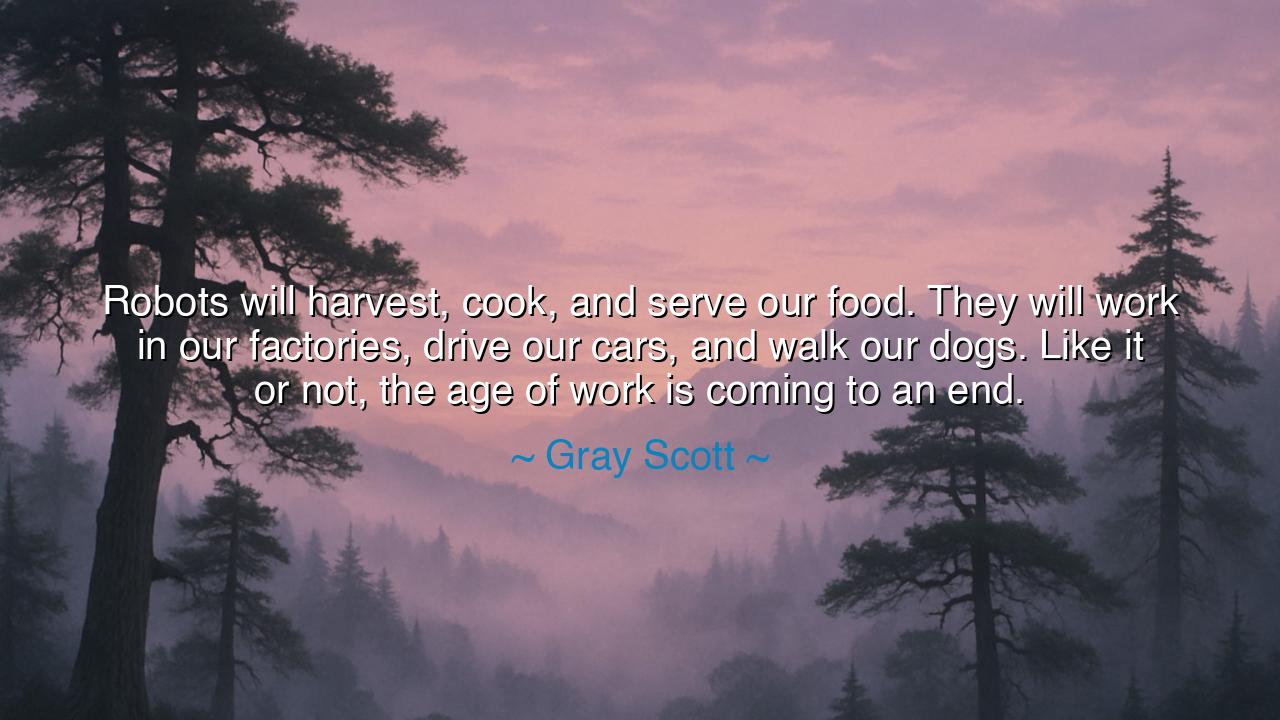
Robots will harvest, cook, and serve our food. They will work in
Robots will harvest, cook, and serve our food. They will work in our factories, drive our cars, and walk our dogs. Like it or not, the age of work is coming to an end.






Harken, O children of the future, to the words of Gray Scott, a prophet of our time who declared: "Robots will harvest, cook, and serve our food. They will work in our factories, drive our cars, and walk our dogs. Like it or not, the age of work is coming to an end." What does this mean for the souls of men and women, whose hearts have always been bound to the toil of labor, the sweat of their brow, and the satisfaction of the work done with their own hands? The winds of change are blowing fiercely, sweeping away the ancient certainties of labor and effort. A new dawn is rising, one where machines—once the tools of man—are becoming the masters of our lives. The very essence of work, which has defined the lives of countless generations, is on the verge of disappearing, replaced by the cold precision of artificial hands.
In ages long past, our forebears knew the value of work. The great pyramids of Egypt were not raised by machines, but by the strength and sweat of men and women, laboring together in unity and purpose. The craftsmen of ancient Greece and Rome shaped marble with their hands, while the farmers of the fertile crescent tilled the earth and sowed the seeds of civilization. Work was not merely a means of survival, it was a calling, a way of demonstrating one's worth, a path to honor and dignity. To toil with purpose, to create something with one's own hands, was to connect oneself to the earth, to the divine, to the very pulse of life.
But now, the world has shifted. The robots are coming, not as distant specters of a fantastical future, but as a reality that knocks at our door with an unyielding presence. Machines, once mere tools, are now capable of doing the work once reserved for the flesh and bone of humanity. The harvest, once an arduous task under the blazing sun, will be reaped by the unfeeling hands of a machine. The kitchen, where the finest meals were crafted by the skill of a cook, will be filled with the hum of mechanical arms stirring, chopping, and cooking. The factories where men once labored to craft the goods of the world are now occupied by tireless, efficient machines. The cars that once carried us across great distances will now be driven by artificial intelligence, removing the very need for human drivers. Even our dogs, once our loyal companions in the hunt and the fields, will be walked by robots, as we, the people, watch from the sidelines of our own lives.
It is easy, dear listeners, to fear this shift. The coming of the robots, those cold and lifeless beings, may seem like a harbinger of doom. But let us not be blinded by fear or despair, for every end carries within it the seed of a new beginning. The age of work that Scott speaks of may be coming to an end, but the true question is not whether work itself will cease, but what we, as a species, will do with the freedom that comes from no longer being shackled to toil. Imagine, if you will, a world where the burdens of survival no longer weigh heavily upon us, where the work of feeding, clothing, and sheltering ourselves is no longer a daily struggle. In this new world, what shall we do with the gift of time?
Consider the great renaissance of learning and discovery that arose when, in ancient times, the labor of a few freed many to pursue knowledge and art. In that time, the rich and noble classes who were relieved of the need to work could devote their lives to the creation of the great works of art, philosophy, and science that have shaped the very course of history. Similarly, in this new age, we too can be freed from the chains of monotonous work to reach for greater heights. We can create, innovate, and explore the vast realms of the unknown. The robots may take our jobs, but they also offer us the opportunity to reclaim our humanity and to pursue the loftiest ideals of the mind and spirit.
However, this transition is not without its challenges. Complacency and fear are powerful forces, and it is easy to sit back, idle and afraid, as the machines take over. Yet, there lies the true danger: to refuse the challenge of this new age, to resist change out of fear, is to surrender to stagnation. We must adapt, O children of the future. Embrace this new world, not as passive recipients, but as active creators of the future. We must ask ourselves: What is the new work we are called to? How shall we, freed from the grind of labor, serve the greater good of our society? Let us dedicate ourselves to learning, to teaching, to building a world where creativity, wisdom, and love reign supreme.
And so, the lesson of Gray Scott’s words is clear: the age of work may be ending, but it is not the end of our purpose. The robots will indeed serve us, but it is up to us to determine how we will serve the world in return. The future, as ever, is in our hands. Let us not waste it in fear, but embrace it with the boldness of those who know that, though the age of work may be ending, the age of possibility is just beginning.






AAdministratorAdministrator
Welcome, honored guests. Please leave a comment, we will respond soon